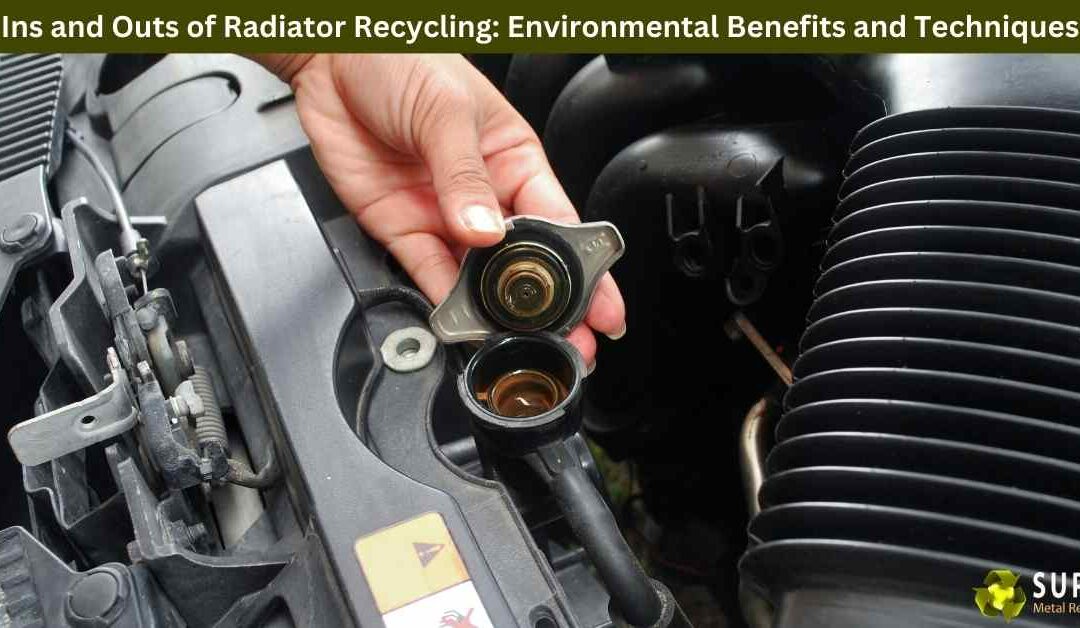Radiators play a crucial role in regulating temperature within various industries, from automotive applications to HVAC systems. However, the disposal of old or damaged radiators poses environmental challenges due to the presence of materials that can be harmful if not properly managed. In this blog, we delve into the ins and outs of radiator recycling, exploring the environmental benefits and techniques that contribute to a sustainable and responsible waste management system.
I. The Environmental Impact of Traditional Radiator Disposal:
Hazardous Materials:
Radiators often contain hazardous materials such as coolant, which may include toxic substances like ethylene glycol. Improper disposal can lead to soil and water contamination, posing risks to ecosystems and human health.
Metal Waste:
Discarding radiators as general waste contributes to the accumulation of metal in landfills, adding to the strain on these sites and diminishing the potential for resource recovery.
II. Environmental Benefits of Radiator Recycling:
Resource Conservation:
Radiator recycling facilitates the recovery of valuable metals such as aluminum and copper. By recycling these metals, the demand for mining and extraction of raw materials is reduced, conserving natural resources.
Reduced Energy Consumption:
Recycling metals from radiators requires significantly less energy than extracting and processing raw materials. This reduction in energy consumption translates to lower carbon emissions and a smaller environmental footprint.
Minimized Hazardous Waste:
Proper radiator recycling ensures the safe handling and disposal of hazardous materials, preventing the release of pollutants into the environment and safeguarding ecosystems.
Economic Benefits:
The recycling of radiators contributes to a circular economy by recovering valuable materials for reuse. This not only reduces the cost of manufacturing new products but also creates economic opportunities within the recycling industry.
III. Radiator Recycling Techniques:
Draining and Safe Removal of Coolants:
Before recycling, it is crucial to drain and safely remove coolants from radiators. Coolants can be collected separately for proper disposal or recycling, preventing environmental contamination.
Material Separation:
Radiators are typically composed of metals such as aluminum, copper, and steel. Effective recycling involves separating these materials, often through mechanical processes or manual dismantling.
Shredding and Granulation:
After separation, radiators can be shredded or granulated to reduce them to smaller pieces. This increases the efficiency of downstream processing and aids in the recovery of valuable metals.
Magnetic Separation:
Magnetic separation is employed to isolate ferrous metals from the shredded radiator materials. This step ensures that steel components can be recycled separately.
Melting and Purification:
The non-ferrous metals, particularly aluminum and copper, can be melted and purified to remove impurities. This process prepares the metals for reuse in manufacturing processes.
IV. Case Studies in Radiator Recycling:
European Metal Recycling (EMR), UK:
EMR has implemented advanced radiator recycling processes, focusing on recovering valuable metals efficiently. Their commitment to sustainable practices has positioned them as a leading player in the metal recycling industry.
Eldan Recycling, Denmark:
Eldan Recycling specializes in developing machinery for recycling various materials, including radiators. Their innovative solutions contribute to reducing the environmental impact of metal waste while maximizing resource recovery.
V. Challenges and Future Trends:
Technology Advancements:
Continued advancements in recycling technology will improve the efficiency of radiator recycling processes, making them more accessible and economically viable.
Regulatory Support:
Regulatory frameworks that support and incentivize radiator recycling can play a crucial role in encouraging businesses and individuals to adopt responsible waste management practices.
Radiator recycling stands as a sustainable solution to address the environmental challenges associated with the disposal of these essential components. By embracing proper recycling techniques, we not only contribute to resource conservation and reduced energy consumption but also ensure the safe handling of hazardous materials. As technology evolves and awareness grows, radiator recycling becomes an integral part of the broader effort to build a circular economy, where materials are reused and repurposed, minimizing waste and fostering a more sustainable future.
If you are in Murrumbeena, Victoria 3163, and looking for a metal recycling service, this is the best way to visit us.
Super Metal Recycling
345 Frankston – Dandenong Road, Dandenong South VIC 3175
(03) 9706 4909


Recent Comments